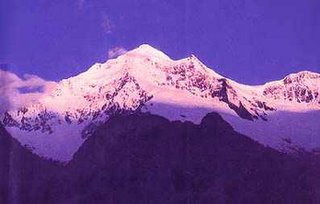 The "rooftop of the world" is melting.
The "rooftop of the world" is melting.Thanks to global warming, glaciers on the Tibetan Plateau are rapidly liquefying, possibly causing many of the region's water woes--especially flooding--in the past decades. The huge meltdown could cause serious ecological trouble in the future, including water shortages, Chinese experts say.
The Tibetan Plateau is the source of many major rivers in Asia.
It is estimated that the annual amount of water melting from the glaciers is equal to the total annual flow volume of the Yellow River.
One of the examples of the speedy meltdown phenomenon is the massive melting glacier on Meili Snow Mountain (Meilixueshan). The 6,740-meter-high mountain is located in the border area between Yunnan province and the Tibetan autonomous region at the southern end of the Tibetan Plateau.
Local Tibetan Buddhists worship the sacred mountain. About 300 Tibetans live in Miyon village, located on the mountain at 2,350 meters above sea level.
The Chinese Academy of Sciences' Institute for Cold and Arid Regions Environment and Engineering Research is in charge of researching the glacier's meltdown.
Usually, glaciers expand as snow accumulates in winter and shrink when they melt in the summer. However, because this glacier is located on a sharp slope, it used to increase in size at a higher rate than other glaciers. For example, from 1959 to 1971, the glacier expanded more than 800 meters.
But the glacier started shrinking by about 20 to 30 meters a year in 1998.
"The abnormal climate has been the norm since 2000. The rise in temperature and the decrease in snowfall is accelerating the speed of the glacier melting," said an official with the meteorological bureau.
"If global warming continues, water volume in large rivers will decrease by 10 to 20 percent in the next 50 to 100 years," He said.
Yao also said: "There is a possibility that 50 to 60 percent of the glaciers on the Tibetan Plateau will disappear in the next 100 years. As long as global warming continues, it is impossible (for us) to prevent the glaciers from melting.
"All we can do to slow the melting speed is to take measures against global warming."